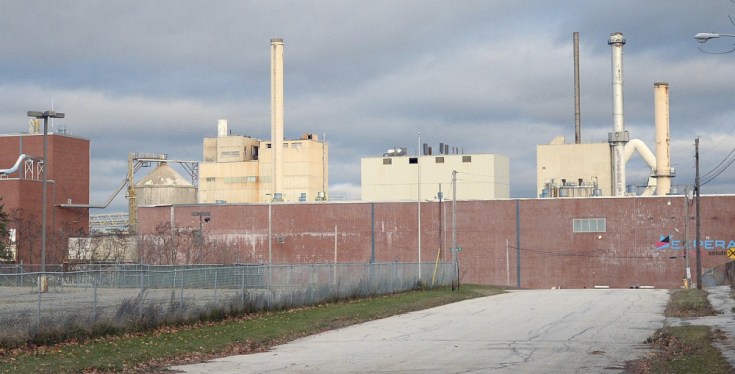The company at the center of a controversy over a lucrative energy contract involving the University of Maine is withdrawing from negotiations.
ConEdison Solutions had won the right to negotiate a contract to power UMaine’s Orono campus with wood-fired steam and electricity from a nearby, abandoned paper mill. But in recent weeks, the Portland Press Herald/Maine Sunday Telegram published stories revealing secret recordings that suggested a university official had provided inside information aimed at helping the ConEdison team win the bid.
In addition, a businessman signed a sworn affidavit saying that the UMaine official – vice president Jake Ward – had improperly advised the bidders. University officials have said that Ward did nothing wrong.
James Page, chancellor of the UMaine system, also has a personal financial tie to one of the companies that stood to benefit from a Con Edison contract.
But UMaine spokesman Dan Demeritt said Thursday that none of those issues had any bearing on ConEdison’s decision to withdraw.
“They proactively withdrew from negotiations based on conditions beyond their control,” Demeritt said.
ConEdison cited uncertainty about its ability to lease assets in the former Expera Mill in neighboring Old Town and said it would not be able to provide a firm pricing offer or an energy delivery plan by the university’s required deadline, according to a University of Maine System statement issued Thursday.
As a result, UMaine officials said they would engage with Honeywell International regarding its bid for the project. Honeywell was the first runner-up in a competitive bidding process for the right to negotiate a contract, the release said. The contract is likely worth more than $100 million.
After an 18-month bidding and review process, the university system decided last summer to negotiate with New York-based ConEdison on its plan to generate renewable energy at the vacant paper mill and send it via pipeline and wires to UMaine.
But soon thereafter, two runners-up formally protested the decision and filed appeals with the university, saying the deal could put taxpayers at risk.
Honeywell and Ameresco Inc. charged, among other things, that ConEdison failed to spell out the cost of its proposal and document any achievable savings, downplayed the regulatory obstacles of sending power from the mill to the campus and, overall, failed to show that the project was feasible.
The university subsequently denied the appeals of both companies. On Thursday a Honeywell representative referred all questions about its newfound role in the energy project to UMaine officials.
In a letter dated Wednesday, ConEdison General Manager Jack Bosch informed the university system of the company’s intent to withdraw from negotiations.
Bosch noted that UMaine had set a deadline of this past Wednesday for ConEdison to provide “firm pricing” and “a plan for gaining control of the power-generating assets of the former Expera Mill.”
He said a key component of ConEdison Solutions’ proposal included making use of the power-generating assets of the former Expera Mill. However, the mill property was purchased recently by OTM Holdings, an affiliate of CVG Inc., one of the members of ConEdison’s proposal team.
“The new owner of the Expera Mill has advised ConEdison Solutions that they are in the early stage of their planning process for the redevelopment of the Expera Mill site, and it has yet to be determined whether the owner’s plans for the Expera Mill site will accommodate ConEdison Solutions’ proposed lease of the power-generating assets to serve the university,” Bosch said in the letter.
ConEdison issued a statement to the Press Herald on Thursday repeating the reasons cited in the letter and said the company would not respond to questions.
Bosch’s letter, however, ignores the fact that ConEdison had been working with CVG for more than a year on plans to use the mill to produce energy for UMaine.
Representatives of OTM Holdings did not return calls seeking comment Thursday.
A Connecticut liquidation firm, MFGR LLC, had been trying since January 2016 to sell the mill property. Last July, Samuel Eakin, managing director of Relentless Capital Co. in Cape Elizabeth, filed a lawsuit claiming he was illegally pushed out of a $10 million deal to buy the mill in favor of a competitor.
Eakin’s company had sought to buy the Old Town mill in 2016, and he filed a lawsuit last July alleging that his former partners subsequently worked with ConEdison and CVG to gain control of the complex. Last week, he gave the Press Herald a sworn statement in which he alleged that Ward, the UMaine vice president, had provided insider information to help ConEdison and its team win the energy project bid.
On Thursday, Eakin expressed skepticism about ConEdison’s stated reasons for pulling out of the UMaine energy project.
“The university, (ConEdison) and CVG are distancing themselves from a corrupt $150 million contract as gracefully as they can, in order to stifle growing public outrage,” he said.
Eakin said UMaine was responding to the same news reports it has dismissed as not being credible. He also cast doubt on the future development potential of the mill, saying it has become tainted by a corrupt process.
Staff Writer Tux Turkel contributed to this report.
Send questions/comments to the editors.



